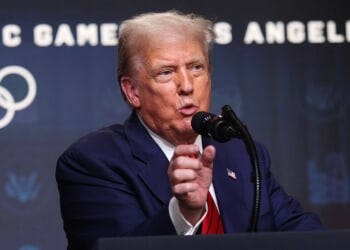Rafe Fletcher is the founder of CWG.
Around half of Hong Kong’s non-Chinese foreign residents left between 2021 and 2024. I was one of them, departing for Singapore in the summer of 2022. The exodus was largely driven by suffocating Covid rules and the 2020 National Security Law, which eroded much of Hong Kong’s remaining independence.
I’ve been back to Hong Kong several times since the end of self-imposed Covid isolation in early 2023. Its dynamism has always appeared somewhat dulled. British friends talk about clinging on in a Sinified atmosphere, increasingly conscious that the new regime holds them in little esteem. Mainland Chinese workers are largely filling the gaps. Traditional Cantonese, with its distinct tonal rhythms, is increasingly drowned out by the “sh”-heavy sounds of the dominant mandarin dialect.
But last week, I saw evidence of a revival. The Financial Times reports that Hong Kong is ahead of global rivals in rankings for initial public offering funds raised. The local Hang Seng is among the best-performing indices worldwide. Hong Kong is now more a window for China to the world rather than vice versa.
That may be little consolation for the foreign hangers on, but China is making a success of it. The country has made major strategic shifts. Hong Kong-based economist Louis Vincent Gave writes about the shock of foreign CEOs returning to witness the progress of this strategy. It is “bypassing Swift, fostering energy independence, and moving up the export value chain.”
That doesn’t mean we should bask in the merits of autocracy. We shouldn’t advocate whole industrial strategies being set at government level, nor the political oppression required to implement it. But we might consider the benefits of independent bodies working with government rather than obstructing it.
Speaking at a conference in the city, the economist Zoltan Pozsar used central banking as an example. Could you imagine, he asked, the PBOC telling Xi Jinping that his plans were a little bit inflationary, so they would be hiking interest rates? Yet the Western press looks with disgust at President Trump pressuring the Fed to work with his policies.
Commentators cast the Fed as the good guy centrist dad. But the US central bank is not a bastion of impartial independence. It has its own agenda. Pozsar cites former Fed president Bill Dudley’s 2019 Bloomberg article, arguing the Fed shouldn’t enable Trump’s economic policies. Its own record is unimpressive, believing inflation was only transitory during Covid and engineering generational inequality through repeated bouts of quantitative easing. But the Fed is unaccountable for such consequences. If elected politicians instead bear responsibility, then investor Stuart Kirk is right to ask, “why something as crucial as borrowing costs to the lives of every citizen should sit beyond a country’s democratic process.”
Liz Truss has consistently pressed the same question since she was dumped as Prime Minister after just six weeks. On Bloomberg’s Odd Lots podcast, she argued the Treasury should play a stronger role in setting the Bank of England’s mandate. Six months after her downfall, it recommended that The Pensions Regulator set minimum collateral cushions for pension funds. Had the advice come earlier, the gilt-selling spiral could have been avoided. Truss’ reforms would have had a fighting chance.
How we laughed about Liz Truss as the free marketeer undone by the market. The completely facile idea that we must bow before its barometer of sentiment at any one time. Analysts scoffed at Steve Jobs’ return to Apple in 1997. Five years later, it was the world’s most successful consumer tech company. Tesla’s short sellers once called the company “effectively bankrupt”. Its valuation today dwarfs the incumbents it was mocked for challenging. Foresight sometimes requires rattling the short-term consensus.
Intuitively, conservatives should value central banking independence. Mervyn King once termed the governor’s remit as NICE (Non-Inflationary Consistent Expansion). Removed from political pressures, it focuses on fiscal prudence and guards against Keynesian expansionism. But that was before celebrity governors like Mark Carney injected his own policy objectives, from Brexit to ESG, into the remit. So too quangos, once promoted by Conservative governments as providing managerial expertise, see figures like Lord Andrew Adonis or Dame Suzi Leather push their own views on HS2 or faith schools.
Singapore offers an alternative model. It values the professionalism of independent bodies, but autonomy is framed within clear political direction. The finance minister sits as chairman of its own central bank, the Monetary Authority of Singapore. It has technical day-to-day independence, but it is part of a coordinated state apparatus. The same is true elsewhere. The Economic Development Board and Enterprise Singapore are formally statutory boards, but strategies are set by cabinet. They court multinationals and direct investment into strategic sectors in service of elected priorities. Even Temasek, notionally a commercially run investment company, reports to the Ministry of Finance and aligns with government goals. Technocrats advise and execute, but politicians are ultimately responsible. And Singapore regularly shifts course as orthodoxy changes. Since the 1960s, it has moved from labour-intensive industry to high-end manufacturing and finance to biotech and AI.
Of course, as I wrote recently, its so-called hybrid democracy and one-party rule makes this easier. But the UK is too fixated on decrying any perceived political meddling in independent bodies as anti-democratic. That naively assumes they are politically neutral. The result is our own democracy has less power than ever to implement change. For the left, it’s a system of righteous restraint. “We can’t do that because this body doesn’t approve.” For the right, a system of blame. “We wanted to do that, but we couldn’t.” Power structures need to pull in the same direction.
I saw last week how a state can pivot wholesale in the space of a decade. That’s what we’re competing with. We may resent China’s methods, but it thinks seriously and strategically and can execute quickly. By contrast, Liz Truss’ attempts to reshape the UK were immediately cast as inherently destructive because they rattled short-term nerves. Resistance to change is inevitable. But we must give elected governments the freedom to test ideas and be judged. Or else be ruled by our own inert autocracy.





![Gavin Newsom Threatens to 'Punch These Sons of B*thces in the Mouth' [WATCH]](https://www.right2024.com/wp-content/uploads/2025/08/Gavin-Newsom-Threatens-to-Punch-These-Sons-of-Bthces-in-350x250.jpg)
![ICE Arrests Illegal Alien Influencer During Her Livestream in Los Angeles: ‘You Bet We Did’ [WATCH]](https://www.right2024.com/wp-content/uploads/2025/08/ICE-Arrests-Illegal-Alien-Influencer-During-Her-Livestream-in-Los-350x250.jpg)








